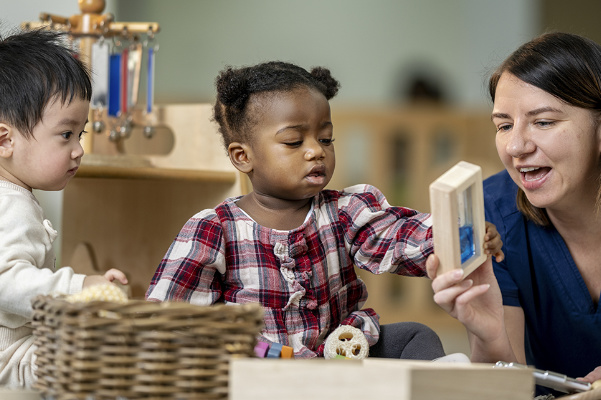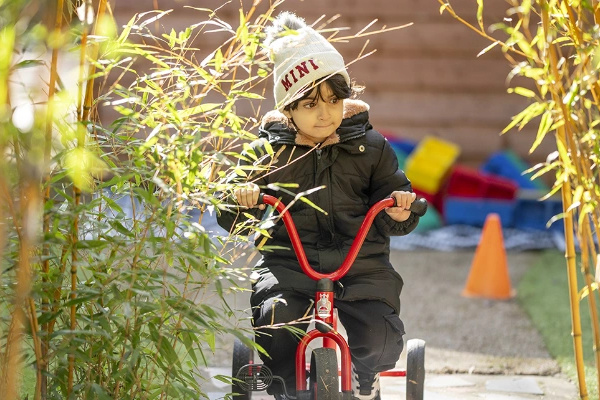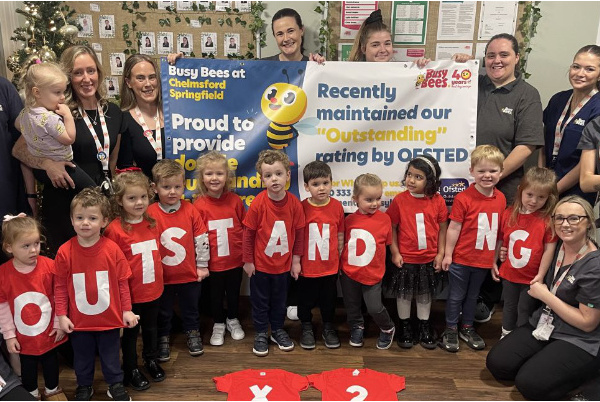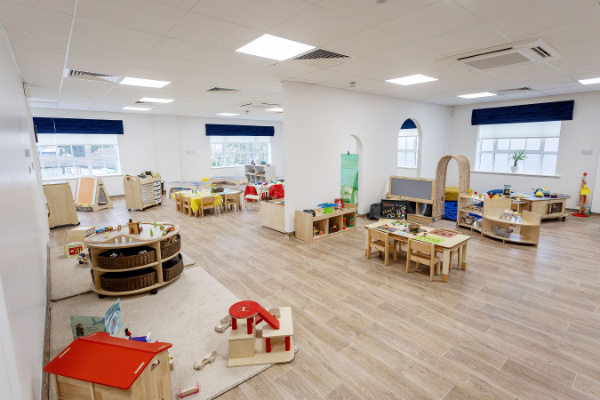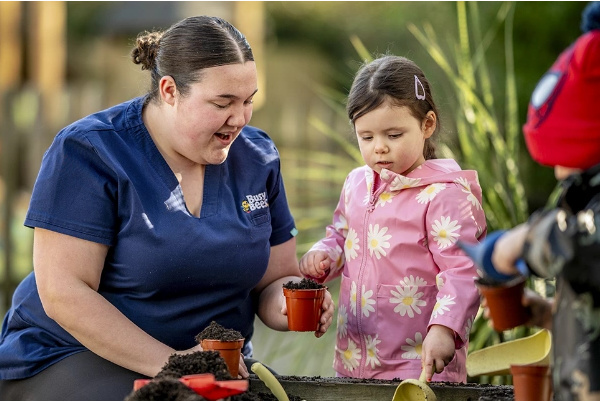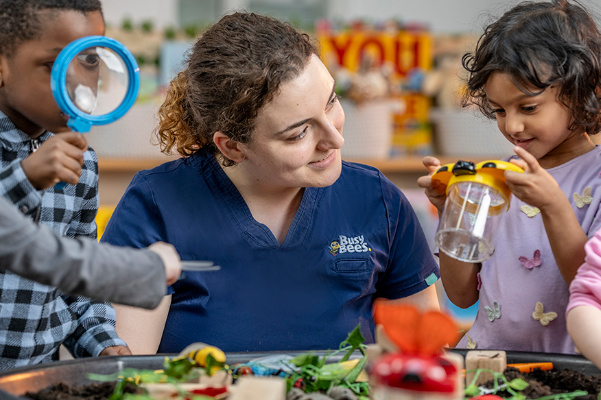Happy and Healthy Development
Nurseries offer a safe and nurturing space where children can learn, play, and grow.
Social Skills and Confidence
Interacting with other children and adults helps little ones develop important social skills and self-esteem.
Peace of Mind for Parents
Knowing your child is in good hands allows you to focus on work or other commitments with confidence.
Smooth Transition to School
A great nursery can prepare your child for the transition to primary school by teaching them the essential skills they'll need.
Every child develops at their own pace, so there's no mystical 'right time' for your little one to begin their nursery journey, but once you've decided to begin exploring your options, here are the most important things to consider.
What to Consider When Looking for a Nursery
Choosing the right nursery for your child is one of the most important decisions you'll make as a parent. It's not just about finding a safe place; it's about choosing an environment where your child will thrive, grow, and be supported every step of the way.
From considering the location and facilities of a nursery to understanding the curriculum and costs, this guide will walk you through the key steps and factors to help you make an informed decision.
At Busy Bees, we understand that every child is unique, and our nurseries are designed to provide tailored care and education to meet diverse needs.
Step-by-Step Guide to Finding the Right Nursery
Step 1: Understand Your Child's Needs
Every child is unique, and their needs will make up a large chunk of your research when finding the perfect nursery. Ask yourself:
- Does your child need additional support, such as SEN (Special Educational Needs) services?
- What kind of penvironment will help them feel comfortable and confident?
- Do they enjoy structured activities or free play?
At Busy Bees, we pride ourselves on offering tailored support to children with varying needs, ensuring every child gets the best start in life.
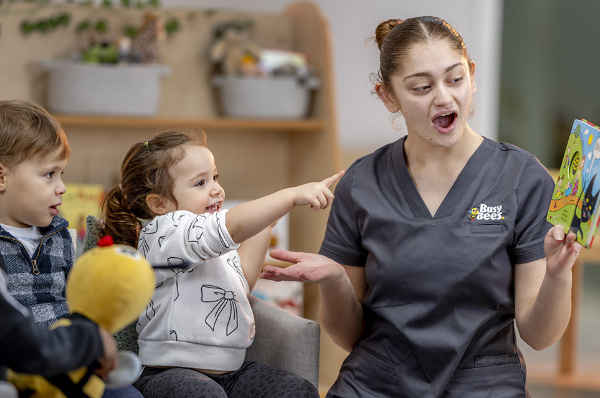
Step 3: Visiting Nurseries
A nursery visit is crucial to getting a thorough understanding of the environment your child will be in. When visiting, consider:
- The atmosphere - does it feel warm and welcoming?
- The engagement between staff and children.
- Cleanliness, safety measures, and overall organisation.
When visiting nurseries, it's a good idea to consider the types of questions you might want to ask ahead of time. To give you some ideas, here are five questions to ask a nursery on your first visit.
Most nurseries will host open days where you and your little can visit and get firsthand experience of your prospective nursery. There are many benefits of nursery open days, and they're fantastic opportunity to explore the facilities, find out how the nursery approaches the EFYS curriculum, and ask any other questions you may have, no matter how small. They're also an excellent way to familiarise your child with the nursery, allowing them to explore the space and interact with the staff, which will ease their transition into nursery.
Curriculum and Daily Routine
For many parents, the idea of having a "curriculum" might feel a bit daunting, especially if you're new to the world of childcare. But it's not about formal lessons or rigid schedules. Instead, a good nursery curriculum ensures that your child is exploring, learning, and development key skills in a way that feels like play.
When considering nurseries for your child, you can be thinking of how the daily routine is planned to help children thrive in their early years. Here's what this might look like:
Play with purpose
Activities designed to spark curiosity and encourage skills like problem-solving, creativity, and teamwork. For example, building with blocks might seem simple, but it helps children develop spatial awareness and early maths skills.
Encouraging independence
From choosing their own activities to tidying up after playtime, children build confidence by learning to do things for themselves in a safe and supportive environment.
Physical development
Active play, both indoors and outdoors, is essential for growing bodies! Whether it’s climbing, running, or dance activity, movement is a big part of the day.
Social and emotional development
Sharing, taking turns, and playing together help children learn how to express themselves and build friendships. Nursery staff are there to nurture them through these important milestones.
Preparation for school
As your child approaches school age, gentle preparation is woven into their day. Activities like story time, learning numbers and letters, and discussions help to build the skills they'll need as they transition to school.
To ensure your child gets the most out of each day at nursery, we've developed our own exclusive curriculum, Bee Curious.
Bee Curious is a playfully-taught model, designed by leading EYFS experts to spark your child's curiosity and lay the groundwork for the transition to full-time education.
The Bee Curious curriculum is a sequenced progression model that grows with your child, supporting them at their level as they develop their key skills, focusing on areas proven to lead to better outcomes in later life such as developing a love of stories and understanding basic mathematical concepts.
Whether they're developing and expanding their vocabulary, building their confidence with basic mathematics, or exploring the natural world, Bee Curious is designed to meet your child at their level and offer them the head start they deserve.
Meals and snacks
Many nurseries provide nutritious meals and snacks as part of their fees, often prepared on-site to meet dietary needs and preferences.
Essentials for younger children
Some nurseries include nappies, wipes and formula milk for babies and toddlers in their pricing.
Extra activities
Depending on the nursery, additional services such as music, language lessons, or outings may be included or available for an extra charge.
Opening hours
Extended hours or flexible schedules may influence the overall cost, so consider your childcare needs when comparing nurseries.
It's important to ask each nursery for a clear breakdown of their fees and understand what's included. This will help you compare options and avoid unexpected costs.
Parent Involvement and Communication
As a parent, it's important to take an active involvement in your child's nursery journey. From supporting their development at home to addressing any anxieties, nurseries work in partnership with parents to ensure that children have a happy, fulfilling experience.
How Nurseries Keep Parents Informed
As your child progresses, your nursery will keep you informed of their development using a variety of methods including:
Digital Platforms
At Busy Bees, we keep you up-to-date on your child's nursery journey using the Busy Bees App, on which you'll receive regular updates including notes on daily activities, meals, nap times, and nappy changes.
The Busy Bees app is a learning journal that's unique to your child, and you'll find photos, videos, and other updates throughout the year. You'll also have the opportunity to post your own observations, making it easier to collaborate with your child's keyperson and address any issues as they arise.
Newsletters
We send regular newsletters, keeping you informed on your child's development and achievements, as well as updating you on the types of activities they've been engaged with.
Our newsletters also feature key dates for your diary, such as themed days or holidays.
Drop-Off Discussions
When you drop your child off at nursery, you'll have an opportunity to discuss their development and activities with their keyperson.
All of our nurseries have parent rooms, where you can sit down for a more in-depth conversation with staff about your child's day.
Encouraging Parent Participation
As a parent, participation in your child's care and development at nursery is crucial. Essentially, you'll work in partnership with your child's nursery and take an active role in their development in social, emotional, and academic contexts.
Studies have shown that by participating in your child's nursery experience, you can dramatically improve your little one's development, as well as boost their motivation and engagement in nursery.
Staff will encourage you to take an active role in your child's nursery journey, and you'll work together to identify your little one's unique strengths, weaknesses, and learning style. By doing so, your child's keyperson will be able to personalise their day-to-day.
By getting (and staying) involved in your child's nursery experience, you can work in tandem with nursery staff to support your child and reinforce positive behaviors and interactions.
It can be as simple as reading books together - especially those being discussed at nursery - or engaging with other topics on the nursery curriculum. However you participate, it'll help foster a love of learning in your child, leading to better outcomes at other education stages.
Settling Your Child into Nursery
Starting nursery can be a daunting experience, and every child settles in at their own pace. And that's absolutely fine! In fact, it's expected and your little one's first few days and weeks at nursery are planned with transition in mind.
To support this transition to nursery, you'll be invited to a settling in session, where you'll stay with your child as they begin to explore the nursery environment and meet the staff and other children.
During this period, they'll also meet their keyperson, who'll support them and monitor their progress as they develop and grow, as well as flag any issues they might experience.
This relationship will be the foundation on which your child's nursery experience is built, and their keyperson will develop an in-depth understanding of their unique approach to the world—from likes and dislikes to how they prefer to be comforted when upset or overwhelmed.
Tips for a Smooth Transition to Nursery
The transition to nursery can be daunting for even the most happy-go-lucky of children. From adjusting to a new physical space to acclimating to longer periods away from caregivers, it's easy for children to become overwhelmed.
And while there's no one-size-fits-all approach, there are several things you can do to ease the transition and ensure your little one settles into their new environment smoothly and happily.
As with any major transition, the key is preparation. The more you do to familiarise your child with their new day-to-day, the fewer anxieties they'll experience in the long term.
For example, you might:

Get Your Child Used to Other Children Before They Start Nursery
It's likely that attending nursery will expose your little one to more children (and adults) than ever before, and, as you can imagine, this has the potential to be overwhelming, or even distressing.
To that end, it's wise to ensure that your child spends as much time with other children as possible before they start nursery. Whether it's attending playgroups or just visiting friends and family, exposure to other children will boost their confidence and help them settle into nursery with fewer hiccups.

Practice the Route to Nursery
Children thrive on familiarity. And while there's no avoiding the anxiety that new environments can bring, you can mitigate some of this anxiety by making nursery a familiar place before your little one's first day.
For example, try practicing the route you'll take to nursery, making sure to point out the nursery each time you pass. By doing so, you'll develop a sense of familiarity for your child, making it a natural part of their day.
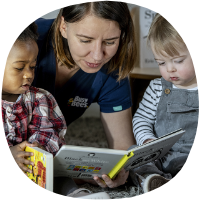
Be Positive When Discussing Nursery with Your Child
Children are emotional sponges, possessing an uncanny ability to sense the emotional state of others, upon which they'll base their emotions.
As such, it's important to be upbeat when discussing nursery with your child. The trick is to frame nursery as an exciting adventure, filled with fun activities and interesting people. (Which it is!)
By doing so, you'll help them get excited about going to nursery, addressing any anxieties they may have.
Managing Separation Anxiety
Separation anxiety is a natural part of your child taking their first steps into the wider world. In their early years, children don't view themselves as separate from caregivers and rely on them for everything.
In fact, when you're out of sight, your little one may not even realise that you're coming back. It's a phenomenon called object permanence, and it's the underlying factor in separation anxiety.
Fortunately, there are several things you can do to address separation anxiety when your child starts nursery.

Keep Goodbyes Short and Positive
A prolonged, overly emotional goodbye will add to your child's feelings of anxiety, exacerbating the issue.
Instead, give them a cuddle and tell them that you'll see them later, being as specific as possible. Nursery staff are trained to handle tears (which should be expected!) and they'll help your little one refocus their attention until your return for pick up.
It can also be wise to prepare your child for longer periods of separation by practising with shorter periods away in the run-up to attending nursery. You might try leaving them in the care of a relative for a short time, slowly increasing the time apart as your child becomes more comfortable with your absence.
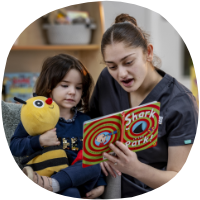
Leave Them with a Comforting item
If your child has a favourite toy, allowing them to take it to nursery with them can help to alleviate separation anxiety by creating a link between home and nursery.
It might be a cuddly toy, a fidget toy, or even just an everyday item that they're fixated on, but they'll draw a great deal of comfort from keeping it with them as they settle into their new environment.

Discuss What You'll Do After Nursery
If possible, make some plans with your child for when they finish nursery, and discuss these plans with them on the nursery run.
It could be as simple as watching a favourite movie together, visiting a relative, or even just what they're having for dinner, but discussing post-nursery plans with your little one will give them something to look forward to and remind them that they'll be coming home after nursery.
Complete All Paperwork
Firstly, and perhaps most crucially, make sure you've dotted the i's and crossed the t's on any necessary paperwork.
Whether that be enrolment forms, funding documents, medical forms, or emergency contact details, getting everything finalised well ahead of your child's start date will prevent any last-minute hiccups and allow you to focus on preparing your little one for their new adventure.
Gather Documents
As part of your child's enrolment in nursery, you'll be asked to provide proof of their age and identity, so be sure to dig out their birth certificate (or a copy) for staff to add to their records.
It's also wise to produce a list of any allergies your child has, as well as any medications they're taking, making sure to include dosages and instructions.
Prepare Your Child for the Transition to Nursery
Starting nursery is a huge step for your child, so it's important to mentally prepare them for the transition. And while every child is different, there are a few tried and true steps that you can take to support them on their new adventure.
In the early days of their nursery journey, your child might be comforted by a familiar toy, blanket, or even item of clothing. Ask them what they'd like to take with them and double-check with staff that it's appropriate.
To avoid unnecessary disruption, be sure to let nursery staff know of any dislikes or preferences your child may have, such as food versions or methods of communication.
If your little one is anxious about what to expect, sit with them and explain the types of activities they'll be engaging in to help them understand what nursery will be like. Some parents opt to role-play nursery or mimic its structure in the lead-up to their child's start date.
Need an idea of what to expect? Check out our handy guide to an average day at nursery.
Above all else, make sure to speak positively about nursery with and around your child—they'll pick up on more than you realise! If you show anxiety around the transition, your child will follow suit, potentially leading to a rocky start.
There's a lot to consider when looking for a nursery. From navigating funding options to preparing your child for the transition, it can be daunting.
But with careful research and planning, the transition can be seamless for you and your little one.
Be sure to bookmark this page to refer back to when you need it.


